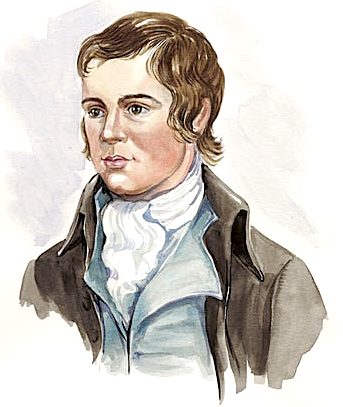Robert Burns In Banff
The Bard's visit to the North East in 1787.
 As
Scotland celebrates the 250th anniversary of the birth of Robert Burns,
Christina Ord writes a brief account of the Bard's visit to the North
East in 1787. Robert's father, William Burnes or Burness, was of North
East farming stock. He left his native Mearns, now a part of south Aberdeenshire,
to find work and eventually settle in Ayrshire.
As
Scotland celebrates the 250th anniversary of the birth of Robert Burns,
Christina Ord writes a brief account of the Bard's visit to the North
East in 1787. Robert's father, William Burnes or Burness, was of North
East farming stock. He left his native Mearns, now a part of south Aberdeenshire,
to find work and eventually settle in Ayrshire.
The following article is taken from the recently published "Book
of Banff - Royal and Ancient Burgh" and is reproduced here by kind
permission of the Banff Preservation Society and Christina Ord.
The book is available from Halsgrove and Community Histories, www.halsgrove.com.
Portrait of Burns courtesy of the SCRAN.
Robert Burns (1759 - 1796) is Scotland's national poet. He was born in Alloway near Ayr the son of a tennant farmer. Among his early influences were the popular tales, ballads and songs of Betty Davidson, an old woman who lived with the poet's family, while being in the company of sailors and smugglers broadened his outlook and his interest in the fairer sex, and he became something of a rural Casanova.
On his northern tour Burns visited Banff in 1787. The account of his visit appears in Chambers' Journal for 1840, written by George Imlach (1775 - 1863) who was a native of Banff. Robert Burns and his friend William Nicol stopped for a night in Banff on 8th September 1787. Nicol looked up an old acquaintance, Dr Chapman, the Rector of Banff Academy. The friends were invited for breakfast along with George Imlach the 12 year old academy dux [the best scholar in the school]. After breakfast George took Burns and Nicol on a tour of Banff with a visit to Duff House. George later recalled that Burns had paid particular attention to the paintings of the Stuarts at the House.
Burns wrote his song "Macpherson's Farewell" as a consequence of what he heard from the Banff locals of the celebrated freebooter who was hanged in Banff in 1700. In doing so he gave an old lament renewed life with his catching refrain:
Sae rantingly, sae wantonly,
Sae dauntingly gaed he,
He played a spring and danced it roon,
Below the gallows tree.
It is also suggested that the original of his song "My Bonnie Mary" was composed by Alexander Lesley of Edan, near Banff, in the mid 1600s.
During the visit to Duff House, Nicol asked young George which of Burns' poems he liked best. The reply was "I like by far "The Cotter's Saturday Night" although it made me greet when my father read it to my mother." Burns looked at George and said "Well my callant, I don't wonder at your greeting at reading the poem, it made me greet more than once when I was writing it at my father's fireside."
While working on his father's farm as a young man Burns wrote some of his best poetry, including George's favourite. He wrote songs, ballads and poems, gathering material from his own and other people's life experiences. From his humble origins and identification with Scottish folk traditions, which he rescued, refurbished and, in part, embellished he gained the title of the National Poet of Scotland. He was never without money worries and his health had been damaged by hard outdoor work. He died in 1796 and is buried in Dumfries.

